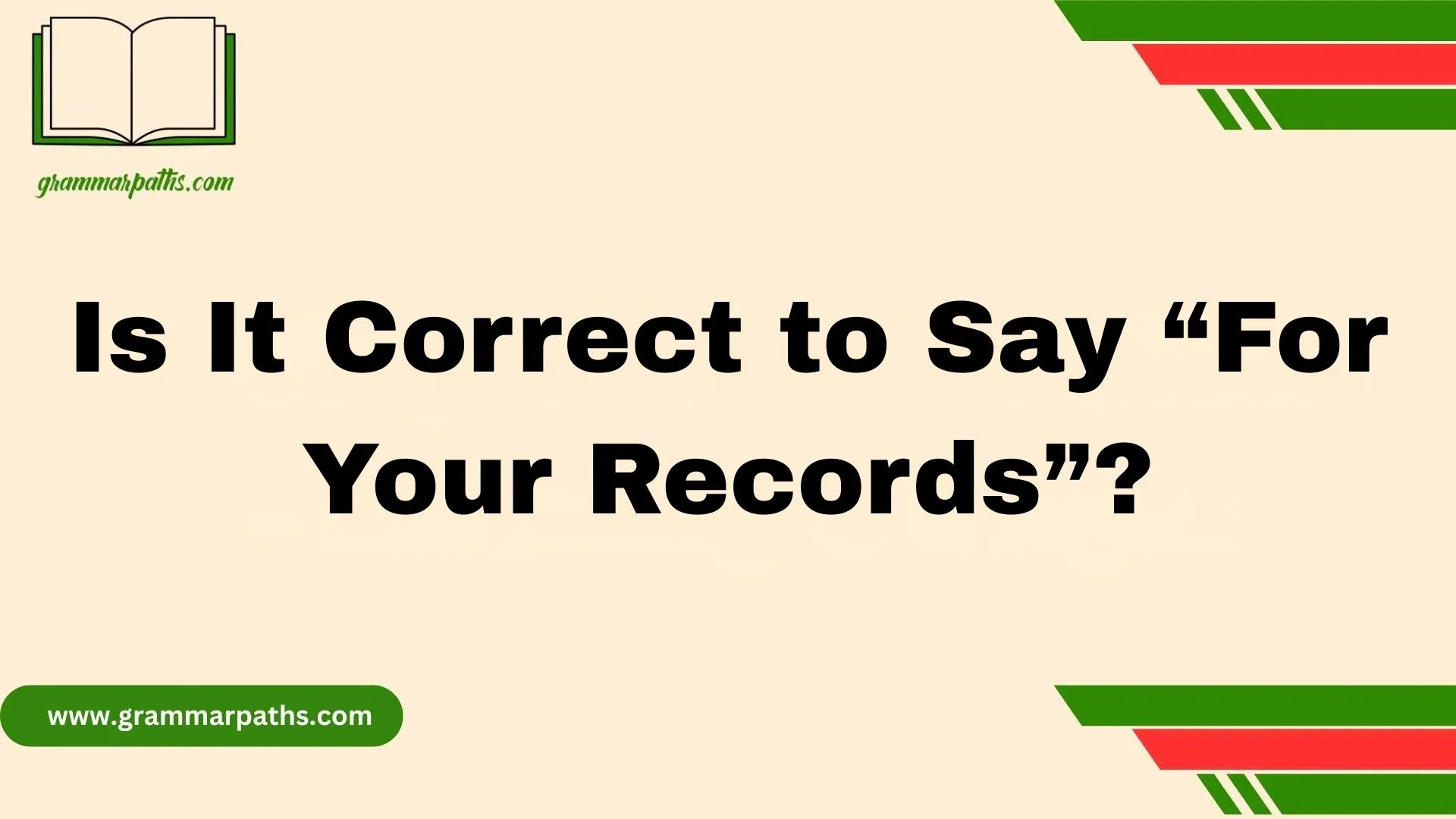We say “for your records” almost every day, and it might feel as natural as slipping on an old pair of shoes that just fit right. It’s a phrase we often throw around in both business and personal communication. You’ve probably seen it in emails, heard it in conversations, or maybe even used it yourself without giving it a second thought. But it’s interesting to stop and really think: Why this exact phrase? The truth is, saying it this way just sounds good to our ears. It’s like a linguistic habit—a familiar expression that lets us clarify that we’re offering information for someone to keep—either as a file, printed copy, or digital attachment.
Whether it’s used to support a report, summarize an upcoming meeting, or offer evidence in formal writing, it’s commonly accepted and even expected. The phrase holds up under scrutiny and aligns with English tradition and current trends. It helps the receiver understand the importance of what’s shared, giving them a reason to save and note it down. It’s like a quiet nod to the purpose of preservation—a way to say: “Here’s something useful, just in case you need it later.” In my experience working with professionals who manage forms, documents, and client letters, this small phrase often prevents future trip-ups when something needs to be called upon again. It offers a clear, purposeful, and authoritative tone that works equally well in casual and formal settings.
Understanding the Phrase “For Your Records”
The phrase “for your records” means you’re giving someone documents or information to keep as a reference or proof. It’s a way to tell the recipient, “Keep this for future use or verification.”
In the US, you’ll hear this a lot in emails, letters, and official communication. For example, companies send tax forms or receipts “for your records” to ensure clients have proof of a transaction or event.
Why does it matter? Because using the phrase correctly keeps your communication clear and professional. When you say “for your records,” you acknowledge the importance of maintaining a paper trail—something that’s crucial in industries like finance, healthcare, and law.
Record vs Records: The Linguistic Difference
At first glance, “record” and “records” seem similar. But they serve different functions.
- Record (singular) refers to a single document or entry. Think of one file, one receipt, or one form.
- Records (plural) refers to multiple documents or files—the whole set of papers someone might keep.
Historically, “records” as a plural came to mean the collection of documents maintained by an individual or institution. The phrase “for your records” implies a bundle of information, even if you’re technically sending one document.
Examples:
- Singular: “I’m sending this contract for your record.”
- Plural: “Please keep these invoices for your records.”
In practice, Americans use the plural “records” much more often because it sounds natural when referring to stored documents.
When to Use Singular “Record”
Though less common, singular “record” has its place. Use it when you refer to a specific, single document.
Practical examples:
- “I’m forwarding this payment receipt for your record.”
- “This letter is for your record only.”
In these cases, the speaker treats the document as a one-off item to be kept. However, this usage sounds a bit formal or old-fashioned. Most modern business communication prefers the plural, as it assumes multiple related documents might be involved.
The Predominant Use of Plural “Records”
In American English, “for your records” is the go-to phrase. It fits well because:
- Most official transactions produce multiple pieces of evidence—emails, receipts, contracts.
- It acknowledges that records may be stored or archived for legal or compliance reasons.
- It sounds friendlier and less stiff than singular “record.”
Common contexts:
- Tax documents (W-2s, 1099s)
- Medical records and test results
- Financial statements and bank statements
- Employment records and performance reviews
Using “records” covers all these papers in one simple phrase.
Formal Communication: Business and Legal Usage
In business, legal, or government communication, “for your records” plays a vital role. It signals that you’ve provided official documentation that the recipient should retain carefully.
Business Email Etiquette:
- Use the phrase near the end of your message for clarity.
- Attach or include documents with a brief explanation.
- Examples of natural phrasing:
- “Attached is the signed contract for your records.”
- “Please keep this invoice for your records.”
- “Attached is the signed contract for your records.”
Legal and financial letters often end with this phrase to reinforce the document’s importance.
Grammar Rules and Nuances
Understanding a few grammar points ensures you don’t stumble when using this phrase.
- Always use “for your records”, not “to your records.”
- Avoid “for your record” unless referring specifically to a singular document.
- The phrase doesn’t take an article: never say “for your the records.”
American vs British English
- Americans overwhelmingly prefer “records” in this phrase.
- British English also uses “for your records,” but might sometimes opt for “for your information” depending on the context.
Practical Situations Where “For Your Records” Fits Best
Let’s break down the common real-life scenarios where this phrase shines:
Providing Documentation or Proof
Whenever you send official paperwork, the phrase reassures the recipient to keep it safe.
- Tax documents like IRS forms
- Proof of payment or invoices
- Medical reports or test results
Case study: A small business owner sends quarterly tax forms to an accountant with the line:
“Please find attached the quarterly financial statements for your records.”
This indicates the accountant should keep the documents for future reference or audit purposes.
Sending Attachments or Files
Email communication benefits from the phrase’s clarity.
- Include it in the message body when sending PDFs or scanned copies.
- Makes the recipient aware that these files are meant to be saved.
Example email snippet:
“Hi Sarah, attached are the signed documents for your records. Let me know if you need anything else.”
Archiving Information for Future Reference
Some organizations require a formal paper trail for compliance and audits.
- HR departments send performance reviews for your records.
- Healthcare providers send copies of medical tests or treatment plans.
Tip: Always follow up with a reminder to save documents securely.
Alternatives to “For Your Records”
Depending on tone and context, you might want to mix it up. Here are some solid alternatives:
| Phrase | Best Used For | Tone |
| For your reference | Informal or casual information sharing | Friendly, casual |
| For your files | Formal, when referring to stored documents | Professional |
| Please retain this copy | Emphasizes keeping the document safe | Formal, legal |
| For your information (FYI) | When just informing, not necessarily saving | Neutral, casual |
When to use these:
- Use “for your reference” when you expect the recipient might review but not file.
- Use “please retain this copy” in legal or compliance-heavy contexts.
- Use “for your files” to highlight the importance of adding the document to an official archive.
Cross-Industry and Contextual Usage
The phrase adapts across many sectors. Here’s how it plays out in key US industries:
Healthcare
Hospitals and clinics send medical records or lab reports “for your records” to ensure patients keep vital health information. HIPAA compliance makes maintaining accurate records a must.
Finance
Banks and financial firms send statements, loan documents, or transaction histories “for your records” to protect both parties during audits or disputes.
Legal
Law firms and courts provide copies of filings, affidavits, or judgments “for your records” as official proof and evidence.
Education
Schools send transcripts, diplomas, or disciplinary notices “for your records” so students or alumni have permanent proof of achievement or status.
Common Mistakes and Misinterpretations
Even native speakers can slip up. Watch out for these pitfalls:
- Mixing singular and plural incorrectly: Saying “for your record” when multiple documents are implied.
- Redundancy: Avoid doubling phrases like “for your records to keep.”
- Confusing with “for your information” (FYI): FYI implies casual sharing, not necessarily saving.
- Overusing the phrase: Using it unnecessarily can sound repetitive or awkward.
Quick tip: If you’re unsure, default to “for your records” when sending official documents.
Quick Reference Table: Correct vs Incorrect Usage
| Sentence | Correct? | Explanation |
| Attached is the report for your records. | ✔️ | Plural “records” is correct and standard. |
| Here is the letter for your record. | ✔️ | Singular used correctly for one document. |
| I’m sending this file to your records. | ❌ | Incorrect preposition (“to”). |
| Please keep these files for your record. | ❌ | Singular “record” doesn’t fit plural files. |
| For your information, please see attached. | ✔️ | Different phrase with different meaning. |
Conclusion:
Saying “for your records” is not just comfortable and familiar—it’s practical. It helps keep communication clear, ensures information is saved for future reference, and maintains a professional yet casual tone when needed. From emails and letters to reports and receipts, this expression fits right into everyday business and personal exchanges.
Whether you’re providing a file for someone to hold, a digital attachment, or a physical copy, you can rest assured that using “for your records” is both correct and purposeful, making your message clear and easy to understand.
FAQs
1. Is it grammatically correct to say “for your records”?
Yes. The phrase is grammatically correct and widely used in English formal and casual writing.
2. Can I use “for your record” instead?
While “record” (singular) is understandable, native speakers almost always use “records” (plural) because it usually refers to multiple documents, forms, or evidence.
3. Where is this phrase commonly used?
It’s commonly seen in emails, business letters, reports, and other documentation to indicate that something should be kept for future reference.
4. Are there alternatives to “for your records”?
Yes. Alternatives include “for your reference”, “for your files”, or “for future use”, which can be used interchangeably depending on tone and context.
5. Why do professionals use this phrase so often?
Because it ensures clarity, helps the receiver know the importance of what’s shared, and provides a quiet nod toward preservation and proper record-keeping.

Grace Marie is the dedicated writer behind GrammarPaths.com, where she shares her passion for English grammar, idioms, and writing mastery. With a strong background in language studies and years of experience helping learners improve their communication skills, Grace creates clear, practical, and engaging content that makes English easy to understand.












